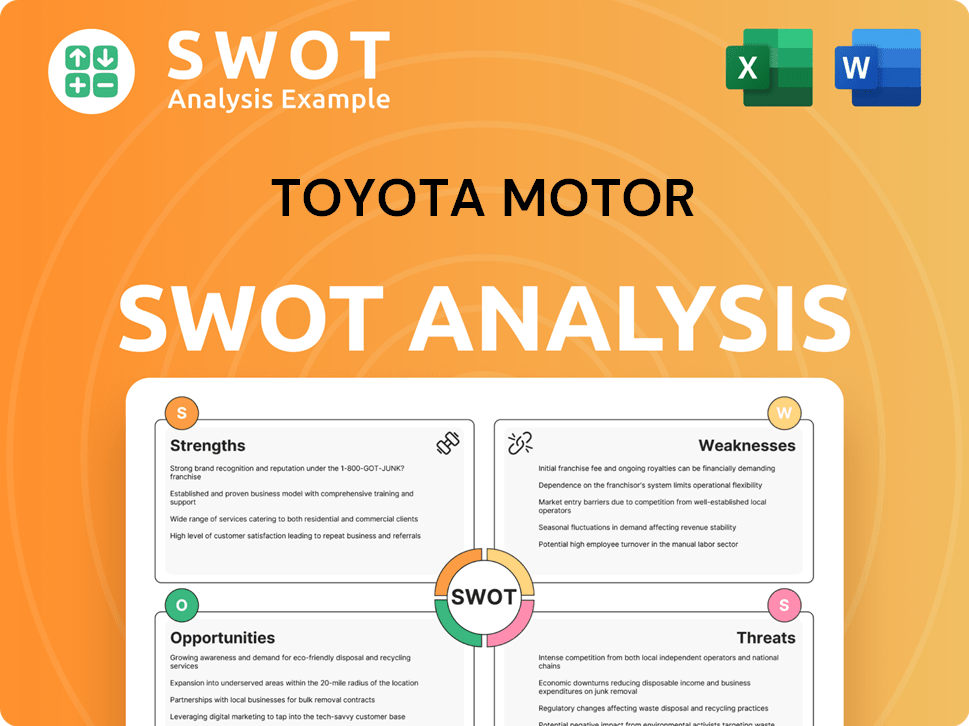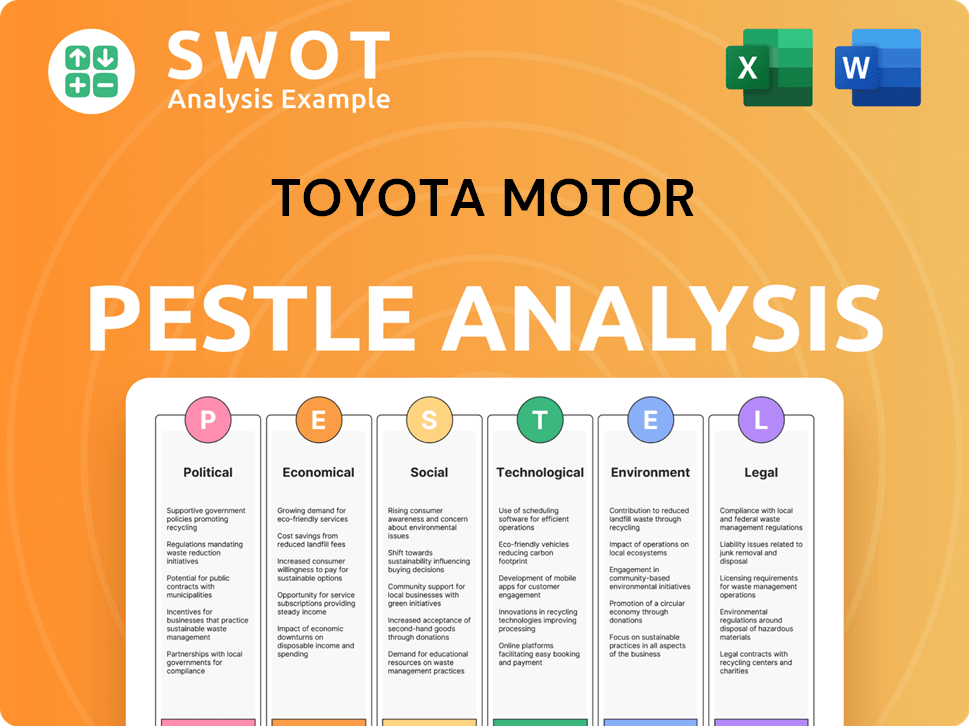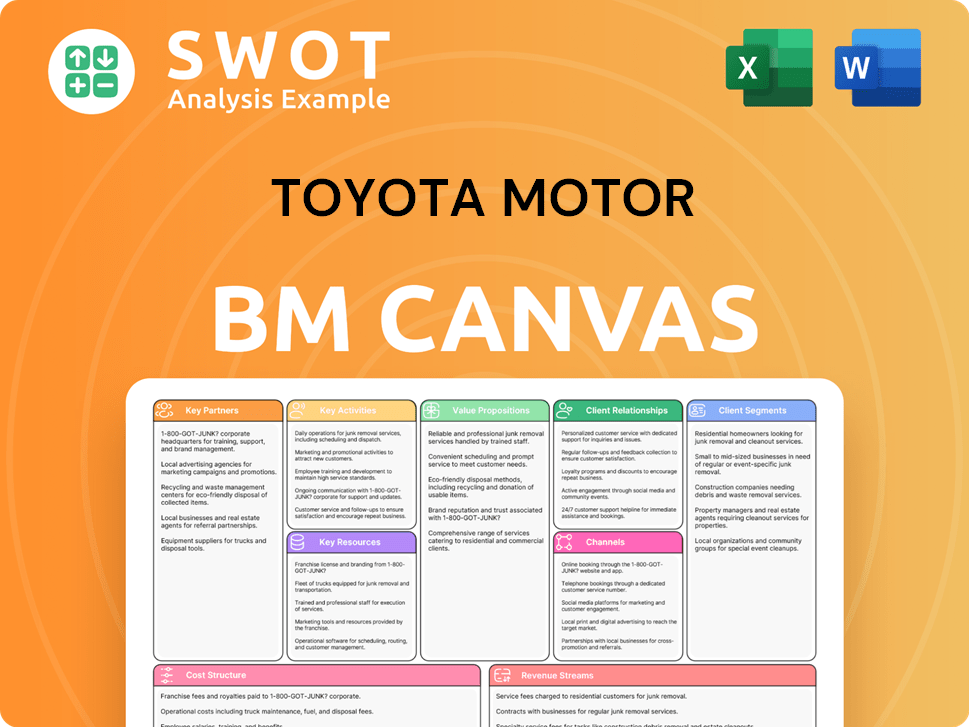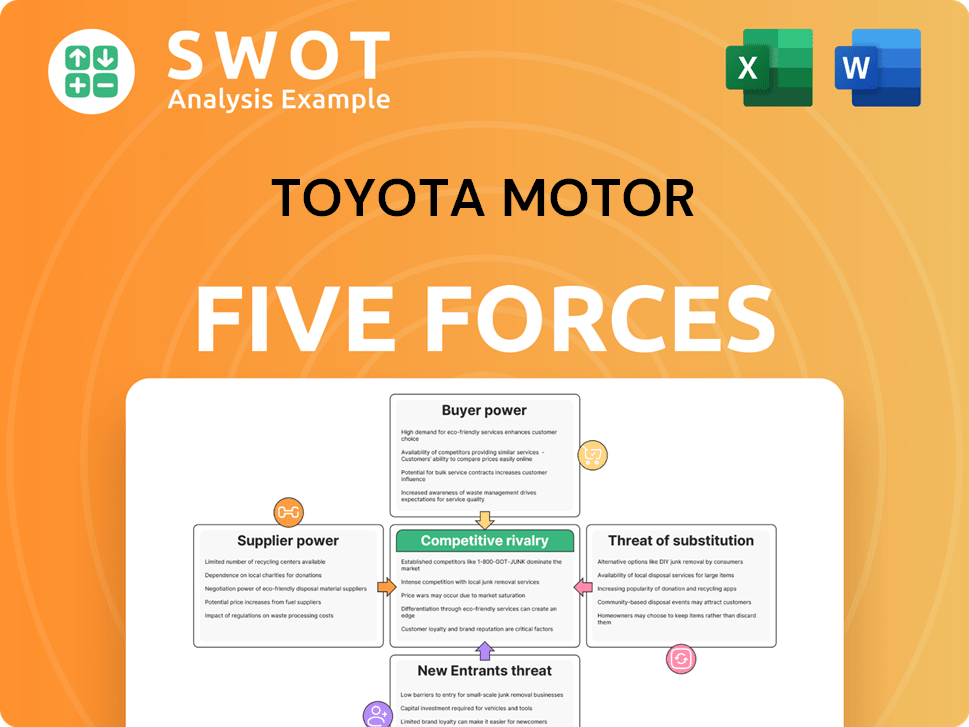Toyota Motor Bundle
Can Toyota Maintain Its Dominance in the Evolving Automotive World?
Toyota Motor Company's journey from a small Japanese manufacturer to a global automotive powerhouse is a testament to its strategic acumen. From its bold entry into the North American market to its current position as a leader in vehicle sales, Toyota Motor SWOT Analysis reveals the company's strategic evolution. Founded in 1937, Toyota's commitment to quality and innovation has shaped its remarkable growth.

This exploration into Toyota's growth strategy and future prospects examines how the company plans to navigate the complexities of the automotive industry. With a focus on Toyota's expansion plans in Asia, its electric vehicle strategy, and its investment in autonomous driving, this analysis provides actionable insights for investors and industry observers. Understanding Toyota's market share analysis and long-term business strategy is crucial for anyone seeking to understand the future of the automotive sector.
How Is Toyota Motor Expanding Its Reach?
The expansion initiatives of Toyota Motor Company are strategically designed to bolster its global presence and diversify its revenue streams. This involves a multi-pronged approach, including geographical expansion, product category diversification, and strategic partnerships. These initiatives are crucial for ensuring sustained growth and adapting to the rapidly evolving automotive industry.
Geographically, Toyota is focusing on emerging markets, particularly in Southeast Asia and Africa. These regions offer significant growth potential due to increasing demand for vehicles and a growing middle class. This expansion helps Toyota mitigate risks associated with over-reliance on mature markets.
Product category expansion is another key focus, with a strong emphasis on electric vehicles (EVs) and sustainable mobility solutions. Toyota aims to introduce a wide range of EV models and explore new business models to adapt to changing consumer preferences and maintain a competitive edge in the automotive industry.
Toyota is actively expanding its footprint in emerging markets, particularly in Southeast Asia and Africa. This strategy aims to tap into growing consumer demand and reduce dependence on established markets. These efforts are critical for long-term growth and market share.
The company is accelerating the development and launch of electric vehicles (EVs) and other sustainable mobility solutions. Toyota plans to introduce numerous EV models by 2030, targeting substantial annual sales. This includes battery electric vehicles (BEVs) and exploring new business models.
Collaborations with key players in the technology and battery development sectors are essential. Partnerships with companies like Panasonic for battery technology and various tech firms for autonomous driving are crucial. These alliances accelerate innovation and enhance competitiveness.
Toyota is exploring new business models beyond traditional vehicle sales. This includes mobility services and subscription models. This diversification helps adapt to evolving consumer preferences and generate new revenue streams. This is a part of the overall Mission, Vision & Core Values of Toyota Motor.
Toyota's expansion initiatives are supported by significant investments in research and development, particularly in EV technology and autonomous driving. The company is committed to achieving carbon neutrality and offering a diverse range of mobility solutions. These strategies are designed to ensure Toyota's continued success in the automotive industry.
Toyota's growth strategy includes geographical expansion, product diversification, and strategic partnerships. These initiatives are designed to enhance its global footprint and revenue streams. The company aims to lead in sustainable mobility.
- Expanding into emerging markets like Southeast Asia and Africa.
- Accelerating EV development, targeting 3.5 million annual EV sales by 2030.
- Forming strategic partnerships for battery technology and autonomous driving.
- Exploring new business models, such as mobility services.
Toyota Motor SWOT Analysis
- Complete SWOT Breakdown
- Fully Customizable
- Editable in Excel & Word
- Professional Formatting
- Investor-Ready Format

How Does Toyota Motor Invest in Innovation?
Toyota's innovation and technology strategy is pivotal to its continued growth, reflecting significant investments in research and development, in-house expertise, and strategic partnerships. The company is heavily focused on next-generation automotive technologies, with a strong emphasis on electrification, autonomous driving, and connected car solutions. This approach is crucial for maintaining its competitive edge in the dynamic automotive industry.
The company's commitment to technological advancement is evident through its substantial R&D expenditure, consistently ranking among the highest in the automotive sector. This financial commitment underscores Toyota's dedication to technological leadership and its ability to adapt to evolving market demands. Toyota's strategy is designed to meet diverse global demands and regulatory environments.
In the realm of digital transformation, Toyota leverages artificial intelligence (AI) and big data analytics across its operations, from manufacturing processes to personalized customer experiences. Automation plays a key role in its production lines, enhancing efficiency and quality. This digital integration is a key aspect of Toyota's overall growth strategy.
Toyota's R&D spending is consistently among the highest in the automotive industry. This significant investment underlines its commitment to innovation and technological leadership, crucial for future prospects. The company's continuous investment in innovation is a key aspect of its long-term business strategy.
Toyota is pursuing a multi-pathway approach to carbon neutrality, including hybrid electric vehicles (HEVs), plug-in hybrid electric vehicles (PHEVs), and hydrogen fuel cell electric vehicles (FCEVs). This diversified strategy allows it to cater to various market needs and regulatory landscapes. The company's electric vehicle strategy is a critical component of its growth plans.
Toyota is heavily investing in autonomous driving technologies, aiming to integrate these advancements into its vehicles. This focus on autonomous driving is designed to improve safety and enhance the driving experience. The company's investment in autonomous driving is a key area of focus for its future prospects.
Toyota is leveraging AI and big data analytics to optimize its operations, from manufacturing to customer service. Automation is a critical component of its production lines, enhancing efficiency and quality. This digital transformation is designed to contribute directly to growth objectives.
Advanced battery technology, including solid-state batteries, is a key area of focus for Toyota, with prototypes expected in the near future. These new technical capabilities and product platforms are designed to contribute directly to growth objectives. Toyota's investment in battery technology is a crucial part of its long-term strategy.
Toyota has a strong record of patent filings, particularly in fuel cell technology and hybrid powertrains, demonstrating its commitment to innovation. This leadership in patent filings highlights its dedication to technological advancement. The company's commitment to innovation is a key factor in its competitive advantage.
Toyota's innovation strategy encompasses several key areas, including electrification, autonomous driving, and digital transformation. These initiatives are designed to enhance its market position and drive future growth. These advancements are crucial for the company's long-term success in the automotive industry.
- Electrification: Toyota is expanding its range of electric vehicles, including BEVs, HEVs, PHEVs, and FCEVs, to meet diverse customer needs and regulatory requirements.
- Autonomous Driving: Significant investments are being made in autonomous driving technologies to improve safety and enhance the driving experience.
- Connected Car Solutions: Toyota is integrating connected car features to provide enhanced services and improve the overall customer experience.
- Digital Transformation: The company is leveraging AI and big data analytics across its operations to improve efficiency and personalize customer experiences.
- Battery Technology: Toyota is focusing on advanced battery technologies, including solid-state batteries, to improve performance and range.
Toyota Motor PESTLE Analysis
- Covers All 6 PESTLE Categories
- No Research Needed – Save Hours of Work
- Built by Experts, Trusted by Consultants
- Instant Download, Ready to Use
- 100% Editable, Fully Customizable

What Is Toyota Motor’s Growth Forecast?
The financial outlook for Toyota Motor Company is robust, underpinned by ambitious revenue targets and strategic investments. For the fiscal year ending March 31, 2025, the company projects consolidated vehicle sales of 10.3 million units. Toyota anticipates achieving a consolidated operating income of approximately ¥4.3 trillion, demonstrating a strong commitment to financial performance.
Recent financial reports indicate solid performance, with increased sales volumes and healthy operating profits. Analysts generally forecast continued growth for Toyota, driven by its diversified product portfolio and strong market presence in key regions. This positive trajectory reflects the effectiveness of Toyota's growth strategy and its ability to navigate the complexities of the automotive industry.
Toyota's long-term financial goals include achieving sustainable growth while maintaining a strong balance sheet. The company aims to generate sufficient free cash flow to fund its ambitious R&D and capital expenditure plans. This disciplined approach to capital allocation is crucial for supporting its growth initiatives, particularly in areas like electrification and advanced manufacturing. For more insights, you can explore the Brief History of Toyota Motor.
Toyota's revenue growth projections are positive, with the company aiming to increase sales in key markets. The automotive industry is highly competitive, but Toyota's diversified product portfolio and strong market presence support its growth. Toyota's financial performance review indicates a focus on sustainable growth and market share analysis.
Toyota is significantly investing in electrification, including electric vehicles (EVs) and hybrid technology. This strategic move is crucial for maintaining its competitive advantage in the automotive industry. Toyota's electric vehicle strategy is a key component of its long-term business strategy and sustainable mobility initiatives.
Toyota's market share analysis reveals a strong position in key global markets, including Asia, North America, and Europe. The company's global market performance is supported by its diverse product offerings and strong brand reputation. Toyota's expansion plans in Asia are particularly noteworthy, reflecting its focus on high-growth regions.
Toyota's financial resilience is bolstered by its strong cash reserves and ability to adapt to market fluctuations. The company aims to surpass historical performance benchmarks by capitalizing on emerging opportunities. This financial strength enables Toyota to navigate challenges and invest in future growth.
Toyota focuses on optimizing production efficiencies and controlling costs to maintain robust profit margins. This includes streamlining manufacturing processes and improving supply chain management strategies. These efforts are vital for ensuring the company's financial health.
Toyota's financial strategy prioritizes investments in research and development (R&D) and capital expenditures. These investments support innovation in hybrid technology and autonomous driving. Toyota's investment in autonomous driving is part of its long-term strategy.
Toyota's ability to adapt to market fluctuations is a key factor in its financial success. The company's response to challenges and opportunities in the automotive sector is crucial. Toyota's new car model releases reflect its commitment to innovation.
Toyota's customer satisfaction ratings are consistently high, which contributes to brand loyalty and repeat business. This positive customer experience supports Toyota's long-term growth. Customer satisfaction is a key metric for the company.
Effective supply chain management strategies are essential for Toyota's operational efficiency. This includes managing the supply of components and materials to support production. Toyota's supply chain management strategies are critical for its financial performance.
Toyota faces both challenges and opportunities in the automotive industry. These include adapting to changing consumer preferences and technological advancements. Toyota's ability to navigate these factors will determine its future prospects.
Toyota Motor Business Model Canvas
- Complete 9-Block Business Model Canvas
- Effortlessly Communicate Your Business Strategy
- Investor-Ready BMC Format
- 100% Editable and Customizable
- Clear and Structured Layout

What Risks Could Slow Toyota Motor’s Growth?
The path to growth for the Toyota Motor Company is not without its challenges. Several strategic and operational risks could potentially impact its ambitious plans. These risks range from intense competition to the rapid pace of technological advancements, all of which require careful navigation.
The automotive industry is highly competitive, and the rise of electric vehicles (EVs) adds another layer of complexity. Stricter emissions standards and evolving safety regulations globally also demand substantial investment and ongoing adaptation. Supply chain vulnerabilities, as seen with recent semiconductor shortages, are another significant concern.
Geopolitical tensions and trade policies introduce further risks to global manufacturing and distribution networks. Internal resource constraints, such as the availability of skilled labor in new technology areas, could also affect the speed of new product development and deployment. Addressing these challenges is crucial for the Toyota Motor Company to maintain its competitive edge and achieve its Toyota future prospects.
The automotive industry is fiercely competitive, with established players and new entrants vying for market share. The shift towards electric vehicles (EVs) intensifies this competition. This requires continuous innovation and strategic adaptation to maintain a Toyota competitive advantage.
Stricter emissions standards and evolving safety regulations across different regions necessitate significant investment and continuous adaptation. Compliance costs can impact profitability and require agile operational adjustments. These changes influence the Toyota growth strategy and necessitate proactive responses.
Supply chain disruptions, such as the global semiconductor shortages, can severely impact production and delivery timelines. Diversifying supply chains and improving inventory management are crucial mitigation strategies. These issues directly affect Toyota's global market performance.
Rapid advancements in autonomous driving and battery technology require constant innovation. Staying competitive demands significant investment in research and development. This directly impacts Toyota's electric vehicle strategy and its ability to compete.
The availability of skilled labor in new technology domains can impact the speed of new product development and deployment. Training and attracting talent are essential for maintaining a competitive edge. This affects Toyota's investment in autonomous driving and other innovative areas.
Geopolitical tensions and trade policies can disrupt global manufacturing and distribution networks. Economic fluctuations can impact consumer demand and profitability. These factors influence Toyota's challenges and opportunities in various markets.
To address these risks, Toyota Motor Company employs a comprehensive risk management framework. This includes diversifying its supply chain to reduce dependency and enhance resilience. Continuous monitoring of regulatory landscapes ensures proactive compliance. Strategic partnerships are formed to mitigate technological dependencies, fostering innovation and adaptability. For further insights into the company's marketing approaches, explore the Marketing Strategy of Toyota Motor.
In fiscal year 2024, Toyota's global sales reached approximately 11.09 million vehicles, demonstrating its robust market presence. Despite challenges, the company has shown resilience, with a focus on sustainable mobility initiatives. The automotive sector continues to evolve, and Toyota's ability to adapt and innovate will be key to its future success. The company's focus on hybrid technology and EV development positions it well for future growth.
Toyota Motor Porter's Five Forces Analysis
- Covers All 5 Competitive Forces in Detail
- Structured for Consultants, Students, and Founders
- 100% Editable in Microsoft Word & Excel
- Instant Digital Download – Use Immediately
- Compatible with Mac & PC – Fully Unlocked

Related Blogs
- What are Mission Vision & Core Values of Toyota Motor Company?
- What is Competitive Landscape of Toyota Motor Company?
- How Does Toyota Motor Company Work?
- What is Sales and Marketing Strategy of Toyota Motor Company?
- What is Brief History of Toyota Motor Company?
- Who Owns Toyota Motor Company?
- What is Customer Demographics and Target Market of Toyota Motor Company?
Disclaimer
All information, articles, and product details provided on this website are for general informational and educational purposes only. We do not claim any ownership over, nor do we intend to infringe upon, any trademarks, copyrights, logos, brand names, or other intellectual property mentioned or depicted on this site. Such intellectual property remains the property of its respective owners, and any references here are made solely for identification or informational purposes, without implying any affiliation, endorsement, or partnership.
We make no representations or warranties, express or implied, regarding the accuracy, completeness, or suitability of any content or products presented. Nothing on this website should be construed as legal, tax, investment, financial, medical, or other professional advice. In addition, no part of this site—including articles or product references—constitutes a solicitation, recommendation, endorsement, advertisement, or offer to buy or sell any securities, franchises, or other financial instruments, particularly in jurisdictions where such activity would be unlawful.
All content is of a general nature and may not address the specific circumstances of any individual or entity. It is not a substitute for professional advice or services. Any actions you take based on the information provided here are strictly at your own risk. You accept full responsibility for any decisions or outcomes arising from your use of this website and agree to release us from any liability in connection with your use of, or reliance upon, the content or products found herein.